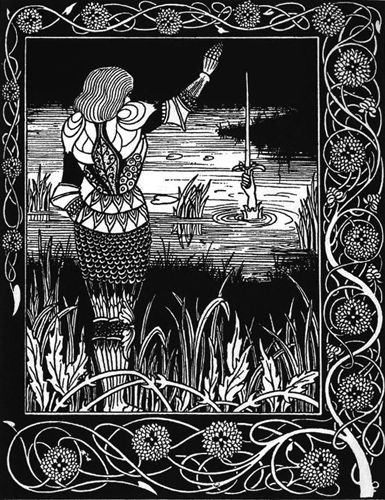spytał Artur.
– Zwą ją Panią Jeziora – odrzekł Merlin.
Śmierć Artura
Dzieło
Śmierć Artura
Thomas MaloryThomas Malory cytaty
„Kto wyciągnie ten miecz z kamienia tego i kowadła jest prawowitym królem całej Anglii.”
Whoso pulleth out this sword of this stone and anvil is rightwise King born of all England. (ang.)
Śmierć Artura
Źródło: Śmierć Artura, Londyn 1485.
Thomas Malory: Cytaty po angielsku
“With that truncheon thou hast slain a good knight, and now it sticketh in thy body.”
Book II, ch. 14
Le Morte d'Arthur (c. 1469) (first known edition 1485)
“Then Sir Launcelot saw her visage, but he wept not greatly, but sighed.”
Book XXI, ch. 11
Le Morte d'Arthur (c. 1469) (first known edition 1485)
“For it giveth unto all lovers courage, that lusty month of May.”
Book XVIII, ch. 25
Le Morte d'Arthur (c. 1469) (first known edition 1485)
Kontekst: The month of May was come, when every lusty heart beginneth to blossom, and to bring forth fruit; for like as herbs and trees bring forth fruit and flourish in May, in likewise every lusty heart that is in any manner a lover, springeth and flourisheth in lusty deeds. For it giveth unto all lovers courage, that lusty month of May.
Book XVIII, ch. 25
Le Morte d'Arthur (c. 1469) (first known edition 1485)
Kontekst: Nowadays men cannot love seven night but they must have all their desires: that love may not endure by reason; for where they be soon accorded and hasty, heat soon it cooleth. Right so fareth love nowadays, soon hot soon cold: this is no stability. But the old love was not so.
Book XXI, ch. 9
Le Morte d'Arthur (c. 1469) (first known edition 1485)
“Whoso pulleth out this sword of this stone and anvil, is rightwise King born of all England.”
Book I, ch. 5
Le Morte d'Arthur (c. 1469) (first known edition 1485)
Book XXI, ch. 13
Le Morte d'Arthur (c. 1469) (first known edition 1485)
Book I, ch. 1
Le Morte d'Arthur (c. 1469) (first known edition 1485)
Book XVIII, ch. 25
Le Morte d'Arthur (c. 1469) (first known edition 1485)
“The joy of love is too short, and the sorrow thereof, and what cometh thereof, dureth over long.”
Book X, ch. 56
Le Morte d'Arthur (c. 1469) (first known edition 1485)
“Then were they afeard when they saw a knight.”
Book I, ch. 23
Le Morte d'Arthur (c. 1469) (first known edition 1485)
Book I, ch. 1
Le Morte d'Arthur (c. 1469) (first known edition 1485)
Book I, ch. 25
Le Morte d'Arthur (c. 1469) (first known edition 1485)
Book XXI, ch. 9
Le Morte d'Arthur (c. 1469) (first known edition 1485)
“What, nephew, said the king, is the wind in that door?”
Book VII, ch. 34
Le Morte d'Arthur (c. 1469) (first known edition 1485)
Book IV, ch. 9
Le Morte d'Arthur (c. 1469) (first known edition 1485)
“I shall curse you with book and bell and candle.”
Book XXI, ch. 1
Le Morte d'Arthur (c. 1469) (first known edition 1485)
“Knight, keep well thy head, for thou shalt have a buffet for the slaying of my horse.”
Book III, ch. 12
Le Morte d'Arthur (c. 1469) (first known edition 1485)
